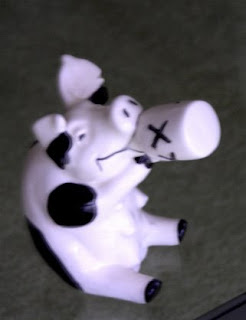






Early in the new century it became clear to me that an entire class of artifacts with historical and cultural significance were in danger of being lost to future generations. They were ceramic souvenirs from the 1940s through the 1960s that celebrated that American icon, the Hillbilly. These included ashtrays, jugs, salt and pepper shakers, coffee mugs, and figurines.
These souvenirs were manufactured in the U.S. and overseas for a traveling public in mountain and Southern states eager to bring something home for relatives related to the scenes they had experienced. The Hillbilly -- the last stereotype still politically correct -- proved be a popular image. These ceramics involve representations of mountain folks, bearing familiar hillbilly themes and stereotypes:
* The men are inevitably heavily bearded, in ragged clothing, with a gun and/or a jug of whiskey at hand and often a dog or a pig at their side;
* The women are puffing on pipes and raising great clouds of smoke; and
* Most people are barefoot and wearing floppy hats.
Dozens of these items were showing up daily on internet auctions, most selling for under $5. My concern was that these interesting examples of Americana would be lost to future researchers and scholars. A collection resides in boxes at the Library of the University of North Carolina at Chapel Hill but is catalogued under the dismissive rubric “Southern Tacky.” Surely, I thought, these examples of American culture deserve better.
As a result, over a four year period I set out to find and buy as many different hillbilly ceramics as possible. By 2006 my collection had grown to 183: 82 ashtrays, 39 jugs, 37 salt and peppers, and 25 miscellaneous banks, toothpick holders, plates, and coffee mugs. Pieces from the collection are shown here.
During the process of collecting, I was able to research some of the potteries responsible for creating the souvenirs. For example, the Clinch Mountain jug depicted was from the Cash Family Pottery of Erwin, Tennessee. About 1945 Ray and Pauline Cash, who had run a pottery sales stand, founded their own ceramic business in Erwin that they first called Clinchfield Pottery and later renamed for themselves. Purchasing molds from defunct potteries and hiring local women decorators, they issued a line of painted stoneware until foreign imports caused them to close in 1989.
The “Corn Likker...Tennessee” jug was from Parkcraft, one among several product names used by the Ahrold Family of Burlington, Iowa, for specialty ceramics they produced at their own facilities or commissioned from other potteries. Their hillbilly jugs actually were made by Taneycomo Pottery of Hollister, Missouri, a town not far from the Branson music center. Parkcraft did the marketing only.
The pair of coffee mugs with hillbilly handles represent two major producers of hillbilly material. The one at left is from a design by Paul Webb known for his cartoons of mountain people. Marked 1948 it was made by the Imperial Pottery Company of Zanesville, Ohio. The mug on the right is from Twin Winton, a California firm that was guided until his death in 2007 by Don Winton, a talented artist and designer. His hillbilly line was launched in 1947.
Another American product is the ashtray with the man sleeping on a pig. It was produced by Charles Houston of Fresno, California, under a copyright of 1950. Other items shown here are either labeled “Made in Japan” or can be identified as such by head gear more akin to Chinese coolies. The origins of the drinking pig are completely uncertain.
Three years ago, as my hillbilly ceramics overran the space to contain them, I looked for a place to donate the collection. Through a series of contacts I was made aware of the Appalachian Cultural Museum in Boone, North Carolina. An adjunct of Appalachian State University, the museum celebrates the lives and activities of mountain people. The curator, Dr. Charles Watson, was delighted to have the donation. He drove a van to my home and carried my collection to Boone.
His museum subsequently lost its space at the University and relocation plans have been pending because of a lack of funds to lease and renovate new space. I still am full of hope that someday soon my hillbillies will find a permanent good home.
No comments:
Post a Comment